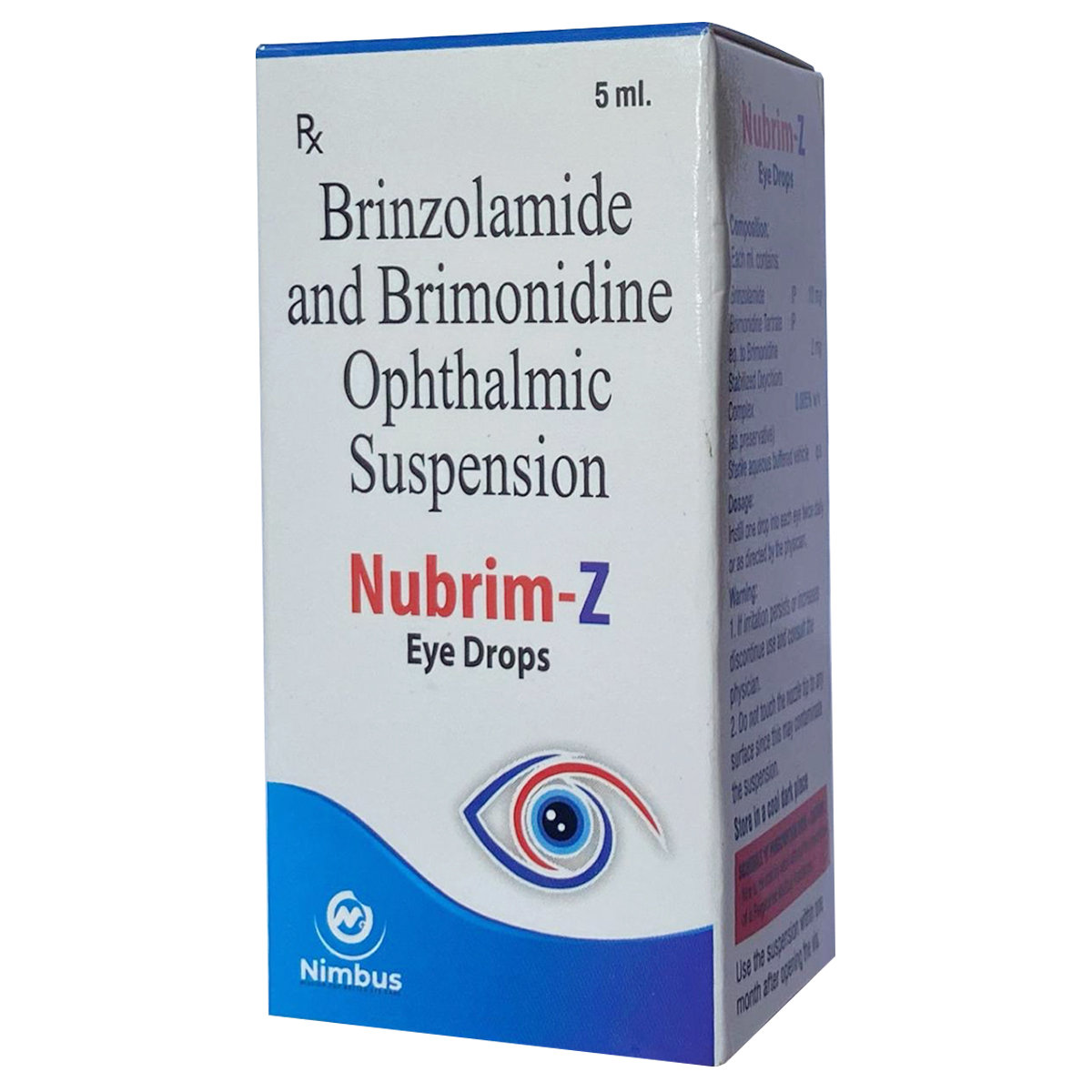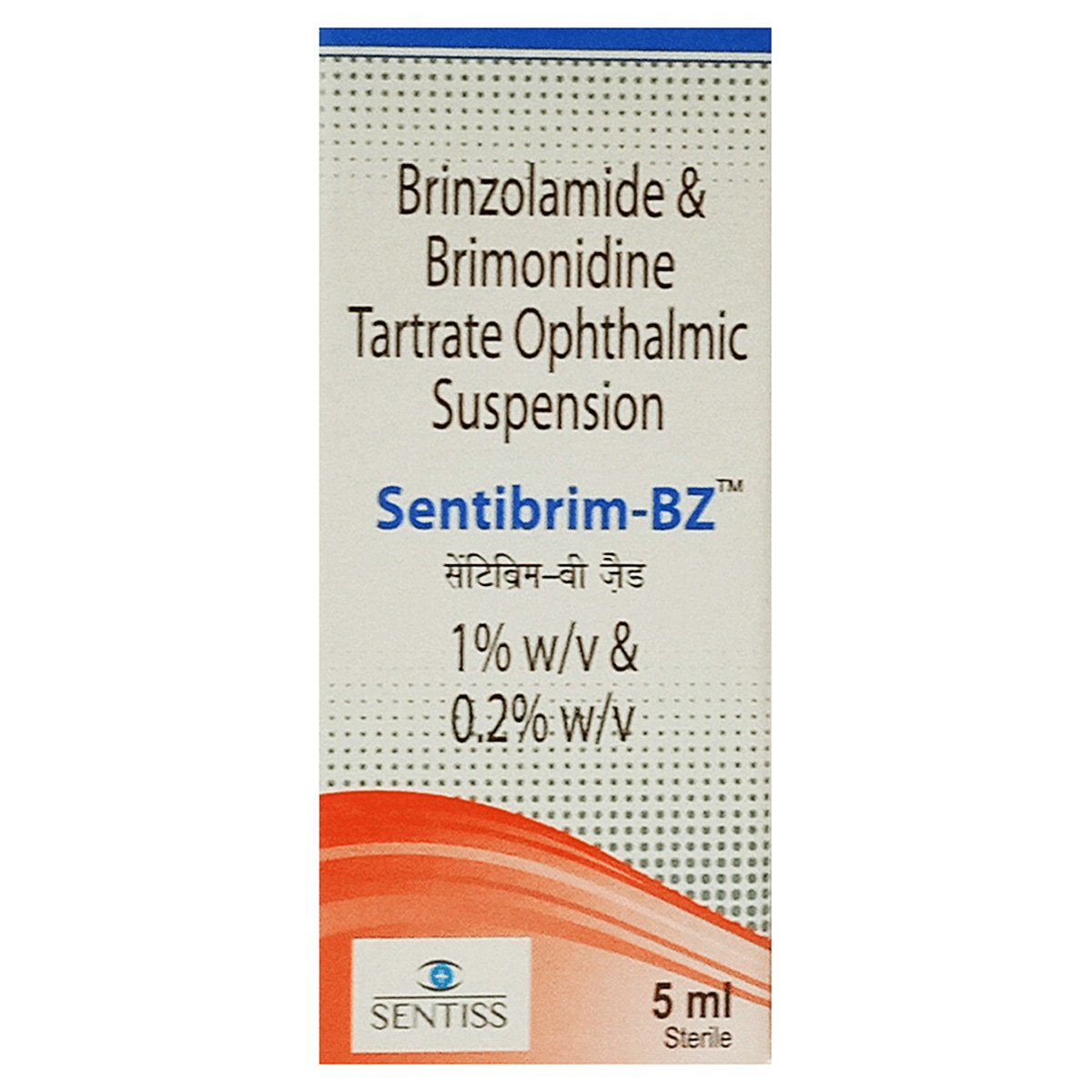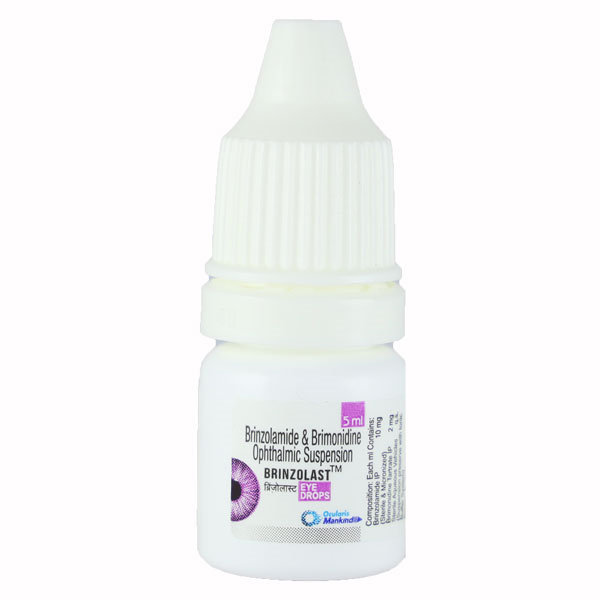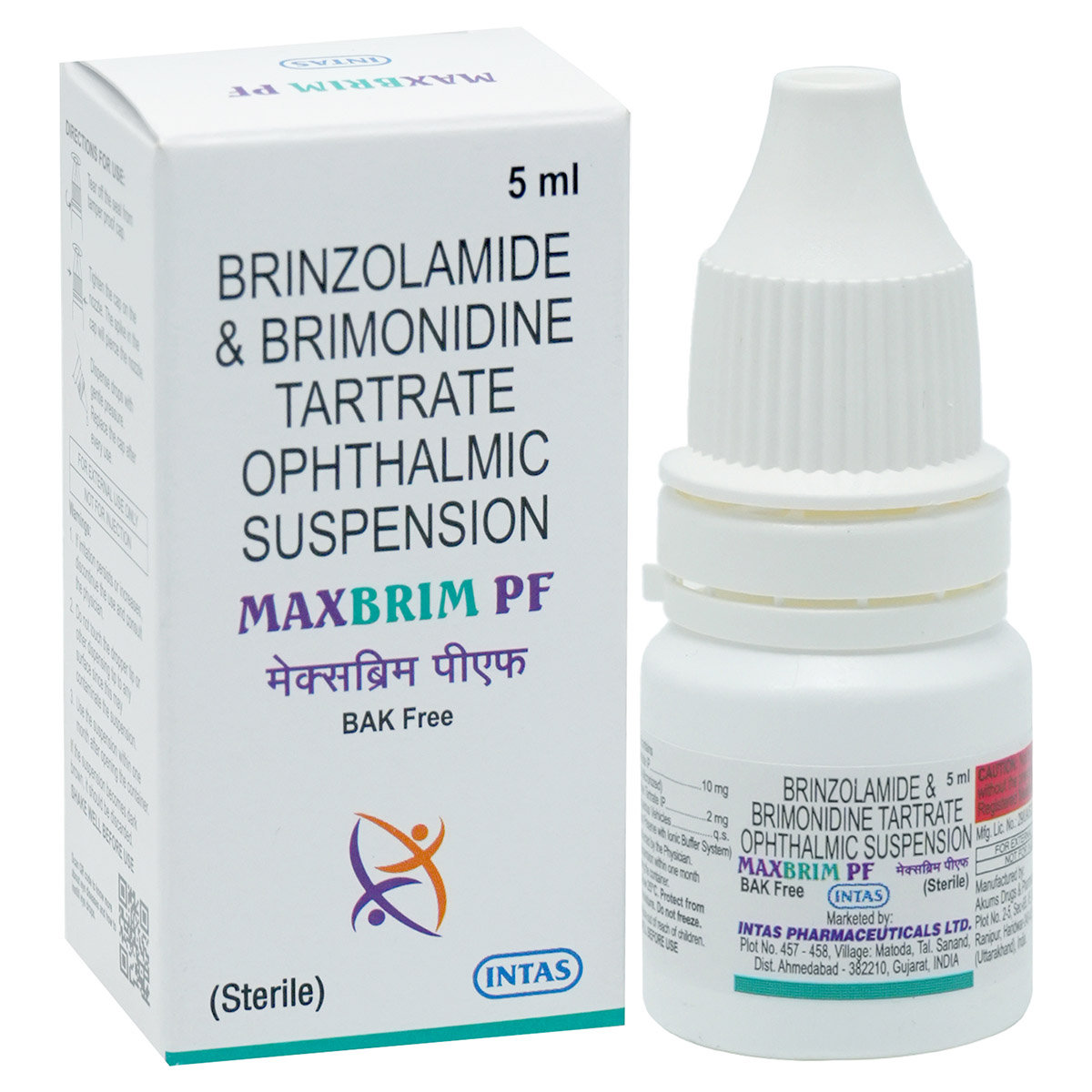Brinzolamide+brimonidine
About Brinzolamide+brimonidine
Brimonidine+brinzolamide is indicated for lowering high intraocular pressure in patients with open-angle glaucoma or ocular hypertension. Glaucoma causes damage to the optic nerve and results in reduced vision. Ocular hypertension is increased pressure in the eye.
Brimonidine+brinzolamide contains Brinzolamide and Brimonidine, which decrease the production of aqueous humour, thereby helping lower the increased pressure in the eye.
This medicine may cause side effects such as blurred vision, eye redness, discomfort, drowsiness and bad taste in the mouth. Talk to your doctor if you experience these side effects persistently.
Consult a doctor if you are pregnant or breastfeeding. Brimonidine+brinzolamide might cause dizziness, drowsiness, and abnormal/blurred vision, so drive only if you have clear vision.
Uses of Brinzolamide+brimonidine
Medicinal Benefits
- Brimonidine+brinzolamide helps decrease high pressure inside the eyes, a major risk factor for optic nerve damage and vision loss in glaucoma.
- Brinzolamide (a carbonic anhydrase inhibitor) works by reducing the formation of aqueous humour (fluid in the eye).
- Brimonidine (an alpha-2 adrenergic receptor agonist) lowers IOP by decreasing fluid production and increasing fluid drainage.
- By maintaining normal eye pressure, Brimonidine+brinzolamide helps protect the optic nerve and supports long-term vision health.
- It is suitable for patients who require combination therapy to achieve target intraocular pressure levels.
- It combines two active ingredients in a single formulation, improving patient compliance and treatment outcomes.
Directions for Use
- Brimonidine+brinzolamide is for ophthalmic (for eye) use only.
- It is recommended to apply one drop of Brimonidine+brinzolamide thrice daily or as prescribed by your doctor.
- Check the label for directions before using this medication.
- Lie down and tilt your head backwards. Gently pull your lower eyelid with your index finger to form a pocket. Instil the prescribed number of drops into the pocket. Close your eyes for 1-2 minutes.
- Replace the cap tightly after each use.
- Avoid touching the container tip to the eye or eyelids to prevent contamination.
Storage
Side Effects of Brinzolamide+brimonidine
- Blurred/abnormal vision
- Eye redness
- Eye discomfort
- Drowsiness
- Bad taste in the mouth
- Dry mouth
- Dizziness
- Eye surface inflammation
- Eye pain
Drug Warnings
- Do not use Brimonidine+brinzolamide if you are allergic to any of its components, if you are taking monoamine oxidase inhibitors, antidepressants, if you have severe kidney problems or excess acidity in the blood.
- Inform your doctor if you have liver problems, narrow-angle glaucoma, dry eyes, cornea problems, coronary heart disease, depression, or poor or disturbed blood circulation.
- Consult your doctor before using Brimonidine+brinzolamide if you are pregnant or breastfeeding.
- Brimonidine+brinzolamide is not recommended for children below 18 years, as safety and effectiveness have not been established.
- Brimonidine+brinzolamide might cause dizziness, drowsiness, abnormal/blurred vision; so, drive only if you are alert.
- Let your doctor know if you are taking any other medicines, including supplements or herbal products.
Drug Interactions
Drug-Drug Interactions: Inform your doctor if you are taking digitalis glycoside (digoxin), drugs used to treat glaucoma (acetazolamide, methazolamide, dorzolamide), antipsychotics (chlorpromazine), an alkaloid (reserpine), antidepressants, antivirals, antifungals, anaesthetics, sedatives, opiates, or barbiturates.
Drug-Food Interactions: No interactions found/established.
Drug-Disease Interactions: Inform your doctor if you have severe kidney problems, depression, heart problems, or excess acidity in the blood.
Drug-Drug Interactions Checker List:
Safety Advice

Alcohol
cautionAvoid consuming alcohol while using Brimonidine+brinzolamide as it might cause increased dizziness and drowsiness. Please consult your doctor if you have any concerns.

Pregnancy
unsafeBrimonidine+brinzolamide belongs to pregnancy category C. Use effective contraception while using Brimonidine+brinzolamide. Avoid using Brimonidine+brinzolamide during pregnancy unless clearly indicated by the doctor. Please consult your doctor if you have any concerns regarding this; your doctor will prescribe only if the benefits outweigh the risks.

Breast Feeding
unsafeBrimonidine+brinzolamide might pass into breastmilk. Avoid breastfeeding while using Brimonidine+brinzolamide.

Driving
unsafeBrimonidine+brinzolamide might cause dizziness, drowsiness, and blurred/abnormal vision. So, avoid driving or operating machinery until your vision is clear.

Liver
cautionPlease consult your doctor if you have any concerns regarding the usage of Brimonidine+brinzolamide in patients with liver impairment.

Kidney
cautionPlease consult your doctor if you have any concerns regarding the usage of Brimonidine+brinzolamide in patients with kidney impairment. Brimonidine+brinzolamide is not recommended for patients with severe kidney disease.

Children
unsafeBrimonidine+brinzolamide is not recommended for children below 18 years, as the safety and effectiveness have not been established.
Habit Forming
Diet & Lifestyle Advise
- Include fresh fruits and vegetables in your diet.
- Avoid smoking and alcohol consumption.
- Avoid intake of baked foods such as cakes, cookies, doughnuts or fried items such as French fries and stick margarine, as these foods may worsen glaucoma and damage the optic nerve.
- Cut down your coffee intake as it may increase pressure in the eye. Replace coffee with green tea.
- Avoid exercises such as any position where the head is lower than the body, like an inverted yoga pose, as it may increase pressure in the eye. Doing selective exercises is advised for glaucoma patients.
Patients Concern
Disease/Condition Glossary
Glaucoma: It is an eye condition that causes damage to the optic nerve (essential for good vision) due to abnormally increased pressure in the eye. If it is not treated in time, it may cause blindness. Usually, there are no symptoms of glaucoma initially, except the slow loss of vision gradually. However, some symptoms include visible rainbow-coloured circles around bright lights or blurred vision. Rarely, glaucoma can develop suddenly with intense pain in the eye, visual disturbance or nausea.
Ocular hypertension: It is a condition caused by poor drainage of aqueous humour (fluid in the eye that maintains normal pressure by its continuous flow). This leads to a build-up of excess fluid in the eye, resulting in increased pressure inside the eye without any damage to the optic nerve. If ocular hypertension is not controlled, it may lead to glaucoma.
FAQs
Brimonidine+brinzolamide is used to lower high intraocular pressure in patients with open-angle glaucoma or ocular hypertension.
Brimonidine+brinzolamide decreases the production of aqueous humour, thereby helping to lower the increased pressure in the eye.
Continue using Brimonidine+brinzolamide for as long as your doctor has prescribed it to you. Consult the doctor if irritation occurs or worsens.
Brimonidine+brinzolamide might cause blurred or abnormal vision. So, avoid driving or operating machinery until your vision is clear to prevent any mishap.
Do not wear contact lenses while using Brimonidine+brinzolamide. Remove contact lenses before using Brimonidine+brinzolamide and put them back 15minutes after using Brimonidine+brinzolamide.
Dry mouth could be a side effect of Brimonidine+brinzolamide. Limiting caffeine intake, avoiding smoking and mouthwashes containing alcohol, drinking water regularly, and chewing sugar-free gum/candy might stimulate saliva and prevent drying of the mouth.
Brimonidine+brinzolamide can be used with other eye medications if prescribed by the doctor. However, maintain a gap of 5-10minutes between Brimonidine+brinzolamide and other eye medications.
Brimonidine+brinzolamide may cause common side effects such as blurred vision, eye redness, discomfort, drowsiness, and a bad taste in the mouth. In most cases, these side effects are temporary and don't require medical attention, resolving on their own over time. However, if you experience persistent side effects, it's best to consult your doctor for guidance.
Yes, Brimonidine+brinzolamide requires a prescription. It is a combination of brinzolamide and brimonidine, used to treat elevated intraocular pressure in patients with open-angle glaucoma or ocular hypertension.
Brimonidine+brinzolamide is not recommended for individuals allergic to its components, those taking monoamine oxidase inhibitors or antidepressants, and people with severe kidney problems or excess acidity in the blood. Additionally, children under 18 years old should not take Brimonidine+brinzolamide, as its safety and effectiveness have not been established. If you have liver problems, narrow-angle glaucoma, dry eyes, cornea problems, coronary heart disease, depression, or poor blood circulation, inform your doctor before taking pramipexole.
Lie down and tilt your head backwards. Gently pull your lower eyelid with your index finger to form a pocket. Instil the number of drops advised by the doctor into the pocket of the lower eyelid. Close your eyes for 1-2 minutes.
Brimonidine+brinzolamide is not recommended for use during pregnancy and breastfeeding unless prescribed by the doctor. The risks and benefits should be carefully discussed with your doctor before using this medication.






